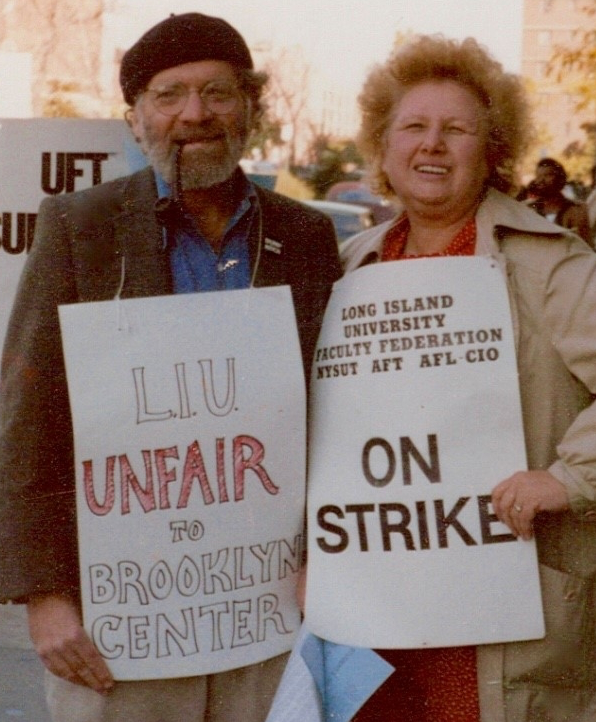Professor Emeritus Danny Gerzog, cherished colleague, comrade, mentor, and friend to many at Pratt, passed away on February 1, 2021. Gerzog began teaching part-time at the Institute in 1959, and full-time in the Department of English and Humanities in 1962. He remained a vital member of the department, now named Humanities and Media Studies, until he retired in 2018. In 2019, through a unanimous recommendation of the department’s faculty and by approval of the Board of Trustees, he was promoted to professor emeritus.
Gerzog received his undergraduate and graduate degrees from New York University. In 1962, he was hired to teach full-time in the Department of English, within the Division of General Studies (now the School of Liberal Arts and Sciences) by the chair, J. Sherwood Weber, to develop business writing courses that provided necessary skills for majors in professional disciplines. During the 1960s, he served as the first head resident of Willoughby Residence Hall, helping to set it up as a student residence and running it with a staff of student advisers, all while maintaining his faculty position. He held this dual position until he was awarded tenure in 1970. Throughout his career, he remained focused on identifying the specific educational needs of Pratt’s unique student body, developing and implementing new curricula, and serving on countless committees. He collaborated with Gillian Jagger, professor of fine arts, to develop a thesis-writing course for students pursuing an MFA that helped the students to articulate their thoughts in accessible language, an effort that helped lay the groundwork for the Writing Across the Curriculum program that still thrives at Pratt today.
Gerzog played a key role in the formation of the Pratt Faculty Union, UFCT 1460 Local, alongside the union’s first president, Estelle Horowitz, an economics professor in the Department of Social Sciences (both are pictured above, supporting their fellow faculty members at a demonstration at Long Island University), an effort that culminated in the signing of the first collective bargaining agreement in 1973. He remained an active participant in the union until he retired, serving on the elections committee in 2010 and 2013, and most importantly, serving as a mentor and guide to his fellow union members. In 2010, the Humanities and Media Studies Department celebrated Gerzog’s half-century of teaching at Pratt with a dinner attended by President Emeritus Thomas F. Schutte, Gerzog’s family, and dozens of his Pratt colleagues. He was a familiar figure at the Clinton Park Café on Hall Street (formerly the Pratt Coffee Shop), where many of his colleagues consumed his words of wisdom along with their coffee before hurrying off to class.
In faculty members’ memories of Gerzog, a few common themes emerge. Many recall that it was due to a fleeting conversation with Gerzog that they first felt welcomed to the Pratt community. For others, he embodied the ancient tradition of hospitality that has held societies together for millennia. He treated everyone the same, whether they had been teaching at Pratt for decades or had only just begun, and so he helped create connections between the past, present, and future in times often characterized by social, professional, and temporal disconnectedness. Faculty recall that he encouraged and validated their political activism. Whether at an Occupy Wall Street rally in Manhattan, at a union meeting on the Brooklyn campus, or collecting signatures to protest the invasion of Grenada, or to nominate a progressive candidate to office, Gerzog offered support and made everyone feel their activism was worthwhile, even if their efforts sometimes went against the political grain of the day. His words and approval mattered because he was respected.
Gerzog demonstrated that teaching is a vocation and not simply a job. He never stopped teaching his colleagues what was important and he never stopped marveling at the brilliance and creativity of his countless students. He reminded everyone that wisdom is eternal, that collegiality, generosity, and humility matter, and that one must first love the world in order to want to change it. The Pratt community honors him and will miss him.
